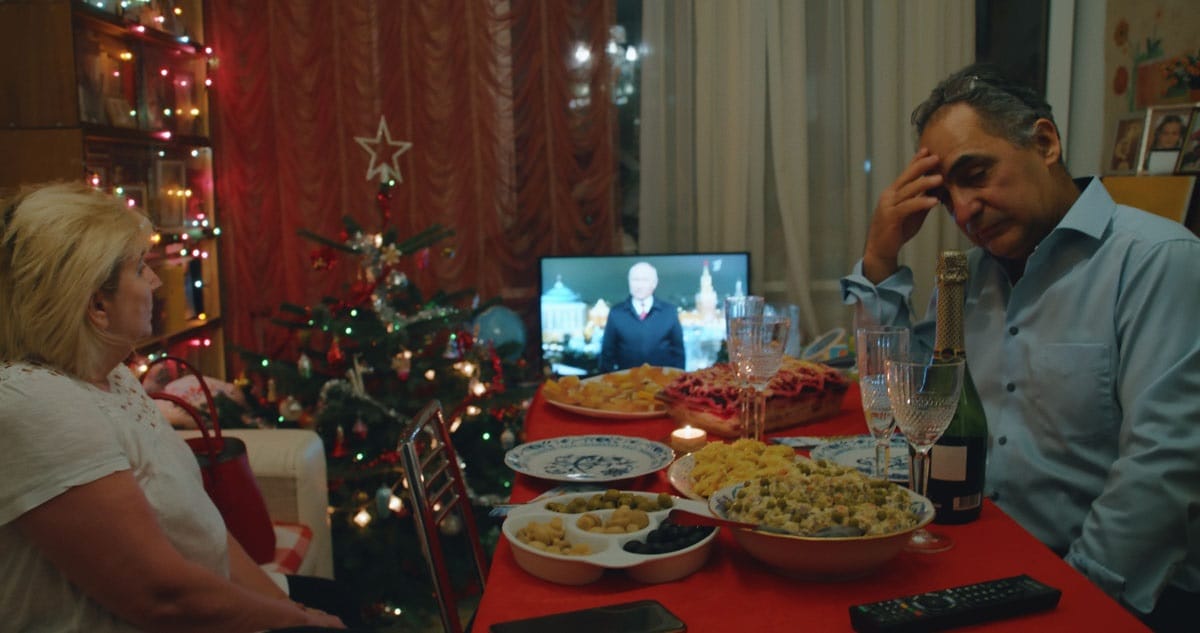BBFF Dispatch #3: Everything Will Be Alright (2023) dir. Staņislavs Tokalovs / The Poet (2022) dir. Vytautas V. Landsbergis & Giedrius Tamoševičius
“I will put a mask on you just in case,” Irina tells her mother at a V-Day event during the pandemic. “Okay, but why?”

The Boston Baltic Film Festival runs in-person from 3/1 through 3/3 at the Emerson Paramount Center and will continue virtually through 3/18. Click here for the schedule and ticket info, and watch the site for Joshua Polanski’s continuing coverage!
Everything Will Be Alright
A digital record of the director’s own family over four years, documentarian Staņislavs Tokalovs’ Everything Will Be Alright has the sort of intimate access that negates the challenge to realism that the presence of a camera often presents. Anyone will act a little different in the presence of a camera, but his closeness to the subjects — three generations of his own ethnically Russian immediate family in Latvia — more than compensates for the strangeness of the camera. Everything Will Be Alright is a touching and sincere account of a complicated domesticity at a hyper-specific cultural moment, namely the pandemic years and the beginning of the war in Ukraine, that questions without resolving what it means to belong to a place.
“I will put a mask on you just in case,” Irina tells her mother at a V-Day event during the pandemic. “Okay, but why?” the clueless grandmother asks in confusion. “It’s a confusing time,” her daughter responds. The matriarch of the family is Ina. At just 16 years old, she joined the Soviet military and fought on the frontlines of WWII, earning her fair share of medals, including one that the Russian military sent her in commemoration during the documentary (“Putin sent you this”). Now she’s in her nineties and struggles with a form of dementia. She mostly floats passively through her days with the assistance of her daughter, Irina. On more than one occasion, there is some confusion between the two about whether or not the aging grandmother has swallowed her teeth. Safe to say, she’s not fully present; yet, the rituals around her anchor the family. Irina connects them most strongly to their Russian past, a history that becomes more and more of the past as the years and generations move forward.
Continue reading at the Boston Hassle.
The Poet
The poet at the center of Vytautas V. Landsbergis & Giedrius Tamoševičius’s film of the same name, Kostas (Donatas Zelvys), is not the typical cinematic artist. He’s no self-wallowing metropolitan libertine graced with a girth of natural talent and an ideology as clear-cut as a textbook. If anything, this overused characterization may describe the inverse of Kostas. He is a lost soul trapped in the body of a famous poet in a decisive time in Lithuanian history.
It’s 1947 and Lithuania is torn in a struggle between the occupying Soviets and the national partisans. The famed poet faces punishments for publishing anti-Soviet material and must teach in a small town as recompense. There he encounters the partisan rebels and finds himself in a pickle between the two ideological stances, flipping the ideological presentation of his writing to best suit his own chance of survival. His writing, in translation, reads so simply in both theme and form that it could be disguised as something one would encounter in a fifth-grade literature class. Kostas himself admits this, acknowledging, perhaps honestly or perhaps not, that he writes his poems for himself and then, in a game of Mad Lib, fills in words like “Stalin” and “Soviet” to pass by the authorities.
Continue reading at the Boston Hassle.